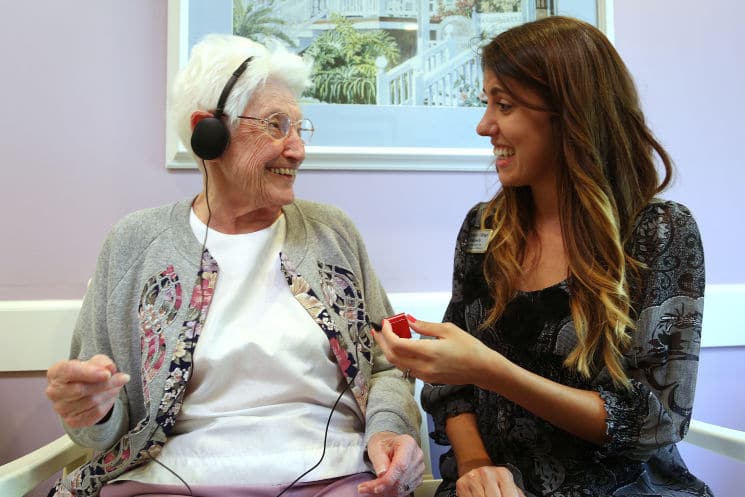
By Kimberly Glem, Care Center Life Enrichment Director
Kimberly graduated from Saint Leo University with a BA in Psychology and holds several professional certificates including Activity Director Certified from the National Certification Council for Activity Professionals (NCCAP), an Assisted Living Facility Administrator Certificate, and a PAC Certified Independent Engagement Leader. She is a member of the Florida Healthcare Activity Coordinators Association. Kimberly is hard of hearing (HOH) and is currently learning American Sign Language (ASL) allowing her to connect to our Residents on a deeper level.
It is my passion and daily mission to find creative ways to connect with those who have cognitive impairments and empower our Residents to utilize their current skills and abilities. Research studies suggest there are many different activities that can help your loved one maintain their cognitive abilities. I have prepared a list of 11 hobbies and activities that can help your loved one cope with the challenges of living with Alzheimer’s.
- Exercise Daily
Science tells us that aerobic exercise can slow the progression of the disease. Adjust the activity and its level to suit your loved one’s abilities, but move somehow, someway, every day. YouTube has a plethora of chair exercises to choose from or you can simply go for a brisk walk or practice light stretching to begin your loved one’s day.
- Engage in Music
Do you consciously tell your foot to tap when you hear a familiar song? Nope, it is an automatic response and that is what makes music so therapeutic for those with Alzheimer’s. Music can be soothing, entertaining, and engaging. Thanks to technology and apps on your phone, you can pull up songs from any era or genre to listen to for fun, or maybe when your loved one needs a calm environment to complete a difficult task, such as dressing. Try narrowing down music selections. For example, choose a song your loved one danced to at their wedding or one that they sang in church. Creating music is just as therapeutic and doesn’t have to be expensive. You can make plenty of instruments with items around your home.
- Reminiscing
Your loved one might enjoy looking through family photo albums or watching home videos. Ask about their older memories, such as their favorite vacation or reflect upon their past achievements. Use photographs to spark memories if reminiscing becomes difficult. You might use a photo of the beach to discuss a beach vacation or a photo of their first car to revisit that memorable time in their life. Reminiscing helps your loved one feel heard; which boosts their self-esteem.
- Puzzles and Games
To slow the decline of Alzheimer’s, your loved one needs to exercise their focus and problem-solving skills regularly. You can use jigsaw puzzles, and word or numbers games which come in various levels of difficulty and in large print sizes. Find the one that best suits your loved one’s abilities and let them complete them on their own or with your help. Board games that involve the family are fun and engaging. Look for one that has only a few steps to maximize your loved one’s potential.
- Time in the Kitchen
At St. Mark Village, we have a community kitchen called Kimberly’s Kitchen, which is a great gathering place for family. As we know, many family traditions revolve around food. Whether its baking cookies or making a meal, there’s no reason your loved one can’t take part. Provide help when needed, but allow your loved one to do as much as they can. This exercises their existing skills and gives a sense of accomplishment once the final product comes out of the oven. Again, you’ll want to make sure the activity is appropriate for their abilities. Assign them tasks such as mixing or using sprinkles to decorate. Provide assistance with measurements or tasks such as chopping.
- Past Hobbies and Professions
Your loved one doesn’t have to give up hobbies such as painting or crocheting just because they aren’t doing them exactly the way they used to. Most hobbies can be adapted to fit current abilities and will help to maintain strength by using gestures and movement they are familiar with. Painting allows for self-expression and can be an emotional outlet for your loved one. Also, consider your loved one’s past professions and how they might be able to incorporate some of those duties into their leisure time. Having a sense of purpose helps Alzheimer’s patients remain motivated to live their best life.
- Reading
Reading is mentally stimulating and can help your loved one work on their concentration. Depending on the stage of Alzheimer’s, your loved one may not remember or comprehend everything they read, so short stories, poems, or newspaper clippings might be best. For someone in the beginning stages of Alzheimer’s, discuss the story, ask questions, and their opinion of the story. Contact your local library to sign up for their free service “Talking Book” when your once avid reader starts having difficulty with this hobby.
- Arts and Crafts
Arts and crafts are great because these types of activities help so many symptoms of dementia. The best thing about arts and crafts is you can do so much with so little, and the even the simplest of crafts can be adapted to suit various stages of Alzheimer’s. Not only do crafts provide a sense of accomplishment, they tap into creative, motor, and attention skills. You can even work on their fine motor skills by putting together a model car, or use plain PVC pipe to stimulate their imagination.
- Household Chores
You may think household chores like sorting socks are monotonous, but for Alzheimer’s patients they can be satisfying. The desire to be needed doesn’t go away with old age or Alzheimer’s. By welcoming your loved one to complete household chores, you help them feel useful and by feeling useful, they feel important. As someone living with Alzheimer’s, it can be emotional to frequently observe others doing so much for you. Participating in household chores allows them to do something for you and that brings balance and positive feelings.
- Watching Television
Many caregivers believe that watching television or movies is a “mindless” activity, when in fact TV does have benefits for an Alzheimer’s patient. TV can ignite past memories or feelings, or be an activity that is merely for enjoyment. Consider watching old favorites or short films on their interests. Shows with babies and animals are usually well-liked. A short program can be a great time for your loved one to transition into another activity. Activate more brain activity by discussing what your loved one just watched.
- Connect with Nature
Tending to plants and flowers is a pleasing experience that brings upon feelings of happiness and accomplishment. This type of activity gives your loved one an opportunity to get outside and connect with nature. Whether from a wheelchair or on their knees, this activity can help maintain gross and fine motor skills, activating all of their senses; smell (scents from flowers), auditory (birds), and touch (textures of leaves), and much more. Connecting with nature is a great time for rest and relaxation which your loved one needs daily. If he/she isn’t up for the outdoors, bring plants inside or create flower arrangements with silk flowers.
These are just some of the many great activities Alzheimer’s patients can take part in. At St. Mark Village, we recognize each individual for who they are. We build upon their past history and encourage them to continue to contribute to their community. Our creative Life Enrichment Program provides meaningful engagement, often resulting in a greater sense of peace and comfort for the Resident and their family.
For more information about our Michael Bilirakis Memory Care at St. Mark Village, visit www.StMarkVillage.org/MemoryCare or call (727) 785-2580.


















